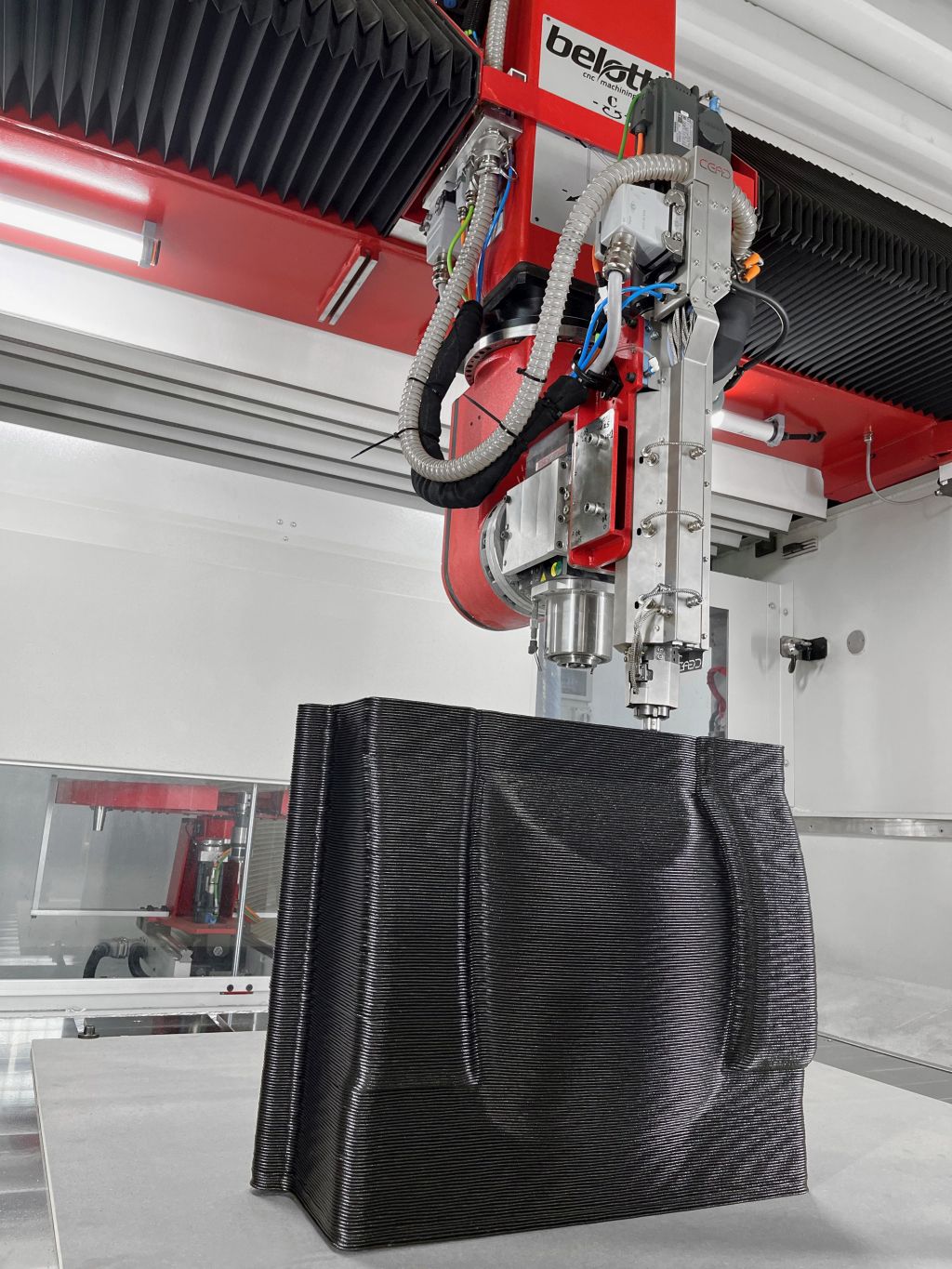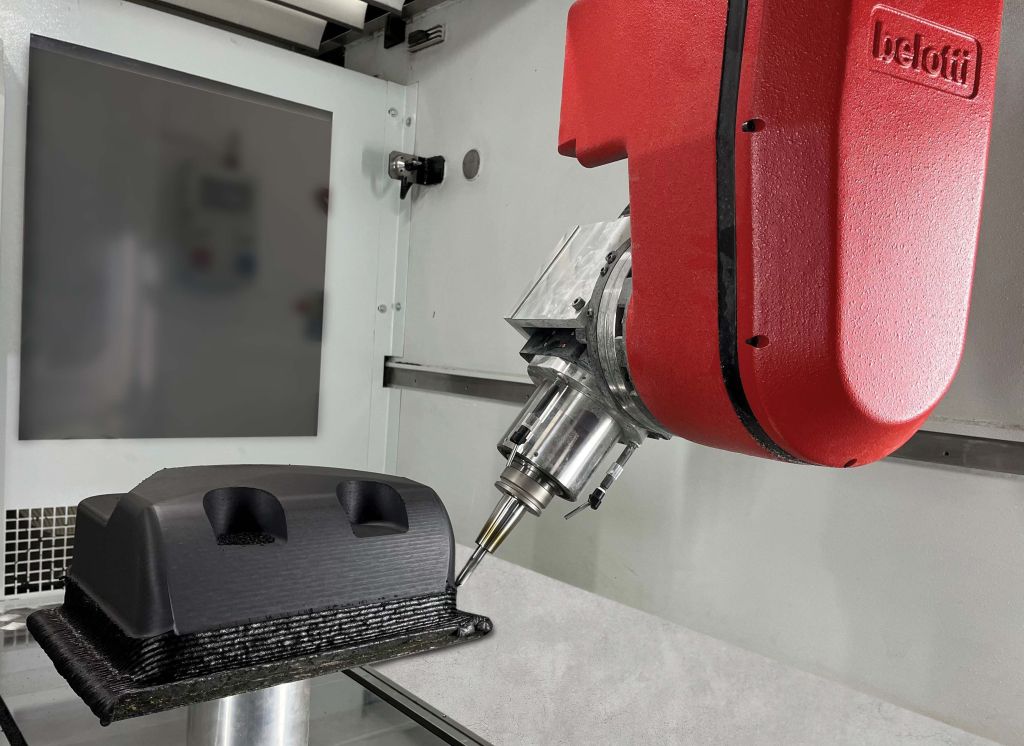The best of both worlds

CNC machine tool provider, Belotti and 3D printing specialist, CEAD collaborate to offer a solution that exploits the best of both worlds by combining the creative potential of 3D printing with the precision of a CNC centre - in a single system.
The BEAD hybrid Large Scale Additive Manufacturing (LSAM) and CNC milling machine is the result of a strategic partnership between Belotti and CEAD company, established to combine the expertise of additive and subtractive manufacturing into one solution. The acquired know-how and experiences in both fields, merged with the innovative drive of both companies is the strong basis of the partnership. The BEAD machine exploits the best of both worlds, combining the speed and creative potential of 3D printing with the precision and reliability of a CNC centre in a single system.

3D printing of an automotive fairing mould at 90°
Through the complete integration of a CEAD extruder for large-scale additive manufacturing (of variable dimensions and output) in a Belotti 5-axis CNC machining centre, BEAD allows the production of parts that are sufficiently oversized to be finished to the required tolerances with times and raw materials consumption lower than traditional methods. BEAD can print almost all fibre-reinforced thermoplastic materials (from commodity to high performance fibre reinforced polymers) exploiting the five axes of the machining centre and printing at different angles, in order to optimise mechanical and thermal properties of produced parts with almost no-limit in working volume.
Together with its customers, Belotti says it has already proved significant improvements in cycle time reduction of small series production, with lead-time and material savings from around 50-80%, depending on the application.
The possibility to save production time consequently allows its customers to reduce power consumption on the overall production process, as the component can be printed and milled in shorter lead-times with respect to the time required by traditional operations to get to a finished part. Also, combining two processes in a single solution instead of using two machines of similar large size results in a lower power consumption, in addition to space saving in the customers’ facility.
The BEAD machine solution is suitable for the manufacture of jigs and fixtures, style models, master models, direct moulds for different processes (i.e., autoclave composite production tools, thermoforming tools, casting tools, room temperature resin infusion tools) and end-user parts.
Going for growth
Since 2019, more than 60% of the compound annual growth rate (CGAR) of the 3D printing market has come from the aerospace, automotive and machining industries (source: JEC Composites), which have represented Belotti’s main markets for more than 40 years. Estimations foresee a year-on-year growth of 3D printing-related composites revenues of up to $10,500 million by 2030. Therefore, the decision to enter the additive manufacturing market comes from both market demand and the intrinsic DNA of a company who always aims to provide the most advanced technologies for composite materials processing.
In terms of the BEAD machining centre attributes that customers will be most happy with, BEAD machines take benefits from the experience of Belotti and CEAD companies in their respective fields. On the Belotti side, BEAD machines can be highly custom-made, with several options regarding working volumes, machine structure type, spindle power and milling features resulting in different levels of precision and accuracy, depending on customer needs.

On the CEAD side, BEAD offers the possibility to process almost all fibre-reinforced thermoplastic materials, thanks to extruders specifically designed for the highest-end materials. Also, the possibility to exploit the five axes of the machining centre allows BEAD customers to print at different angles, optimising printing strategies and component properties, as it is possible when using robotic arms. Belotti reckons that flexibility, accuracy and fast cycle times are the key benefits most appreciated by its customers.
And with regard to the kinds of productivity benefits and synergies Belotti’s customers can enjoy from the implementation of the BEAD machine on their shopfloors, the company states that by combining two processes in a unique machine allows customers to save money on an initial investment, so that inexperienced customers can start approaching additive manufacturing and develop AM design thinking, trial after trial. In terms of space, BEAD combines flexibility of 3D printing extruders with CNC gantry precision and reliability in a single working environment, reducing footprint within the production plant and, depending on the application, skipping the movement of a component from the 3D printing platform to the milling machine. This can take time, especially with large parts that must be repositioned if moved within the set-up time from 3D printing to CNC milling mode.
A competitive market
Does Belotti foresee more traditional CNC machine tool companies moving into the additive manufacturing arena to offer LSAM solutions? Almost all CNC machine providers are moving into the AM market to offer LSAM solutions with lots of different 3D printing technologies - from polymers and composites to metals processing. It is a healthy and productive competition which pushes everyone to improve and optimise their own solution, involving not only machine manufacturers but also materials and software developers too. Every player in the AM market has a key role in the spreading of AM technology and no-one can succeed without the support of the other. AM success and growing application passes by the joint development of hardware, software and material solutions.
Several machines will be fully operational by the end of 2023, by which time Belotti will have installed BEAD solutions in different customer markets. Many pilot projects have already been carried out and testing will go on both in showroom in Italy and at customer facilities, which will become references for new interested customers.
Exhibitions throughout 2022 proved extremely successful, with lots of visitors at JEC, K and Formnext exhibitions, where Belotti showcased BEAD and other projects it is working on. The company has big plans for the next JEC World show, as well as the expansion of its second production facility in Modena, Italy, in order to stay even closer to its biggest markets of automotive and motorsport, which are obviously showing increasingly more interest in the BEAD solution.
Aligned to Industry 4.0
BEAD technology is perfectly aligned with Industry 4.0 principles and the idea of a future factory based on automated and more efficient production processes. With the creation of the BEAD machine and the new Belotti Robotic Automation division, Belotti aims to offer customers better and more complete solutions able to improve companies’ productivity saving time, waste and costs always keeping the highest quality standards which its traditional solutions already provide.
What differentiates the BEAD machine tool from the competition is Belotti’s relationship with CEAD. Belotti is a leader in CNC solutions, whilst CEAD is a leader in 3D printing solutions with a deep knowledge and experience of composite material processing. Working together allows each company to provide customers the best of both worlds, and at same time, learn from each other. A daily exchange of ideas for technology improvements, together with a close relationship with partners from milling and AM world is the key for keeping the technology updated, distinguishing BEAD from competition.
BEAD technology is possible in different configurations with variable build volumes, extrusion outputs and printing orientations. Therefore, the partners can provide tailor-made solutions according to the customers’ production needs and technical specifications. Belotti’s hope is to never stop growing in terms of people, expertise and markets where its products can find applications, strengthening old partnerships and establishing new ones - always in tune with the company’s mission and vision.
Belotti recently opened a new division called Belotti Robotic Automation, which specialises in the design and supply of robotic lines and cells, all manufactured in accordance with the customer’s needs and with the aim of optimising the production processes.
Through the supply of automated turnkey solutions, Belotti proposes itself as a unique partner throughout the entire design, production, installation and maintenance process, guaranteeing competence and promptness of intervention - both on the CNC machining centre, as well as on the whole automation system.
The division offers tested technological processes covering all robotics applications, from a simple loading/unloading cell to the most complex assembly plants. The design of automation systems can be applied both on existing CNC systems, as well as on a whole production process by taking advantage of the company’s Belotti Integrale (Belotti CNC + Automation process) technology.












